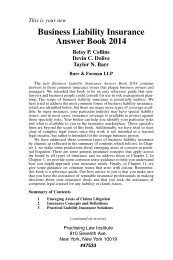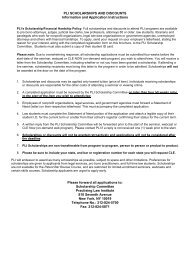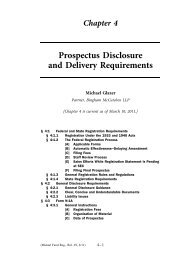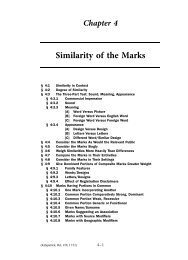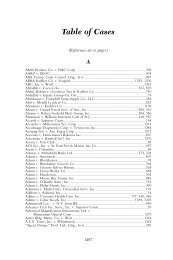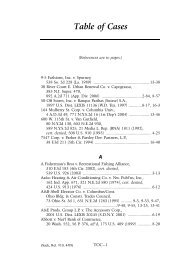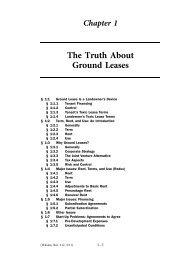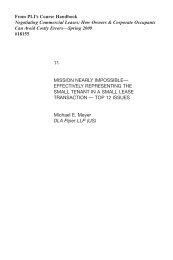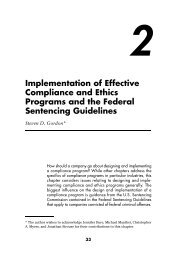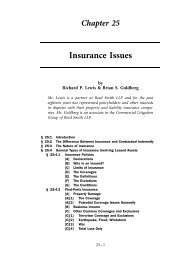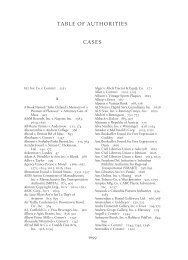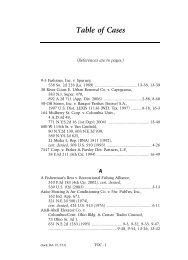Breach of Fiduciary Duty
Breach of Fiduciary Duty
Breach of Fiduciary Duty
Create successful ePaper yourself
Turn your PDF publications into a flip-book with our unique Google optimized e-Paper software.
<strong>Breach</strong> <strong>of</strong> <strong>Fiduciary</strong> <strong>Duty</strong> § 7:2.3<br />
near standardless dimension to the punitive damages equation.” 138.11<br />
However, the Court stated: “Evidence <strong>of</strong> actual harm to nonparties can<br />
help to show that the conduct that harmed the plaintiff also posed a<br />
substantial risk <strong>of</strong> harm to the general public, and so was particularly<br />
reprehensible . . . .” 138.12 However, the Court cautioned, “a jury may<br />
not go further than this and use a punitive damages verdict to punish a<br />
defendant directly on account <strong>of</strong> harms it is alleged to have visited on<br />
nonparties.” 138.13 Thus, “it is constitutionally important for a court to<br />
provide assurance that the jury will ask the right question, not the<br />
wrong one.” 138.14<br />
[C] Prejudgment Interest<br />
Where an accountant is held liable for breach <strong>of</strong> fiduciary duties, he<br />
or she may also be liable for prejudgment interest on the amount<br />
awarded to the plaintiff. Most courts will award prejudgment interest<br />
in several situations. First, prejudgment interest will be awarded on a<br />
liquidated claim or a claim the amount <strong>of</strong> which is readily ascertainable.<br />
139 Second, prejudgment interest will be given on an award <strong>of</strong><br />
restitution. 140 In the fiduciary context, the prejudgment interest on a<br />
restitutionary recovery operates to deprive the fiduciary <strong>of</strong> all possible<br />
benefit from his or her breach <strong>of</strong> fiduciary duty. A court may award<br />
prejudgment interest on a restitutionary award against an ERISA<br />
fiduciary for breach <strong>of</strong> a fiduciary duty owed to an employee benefit<br />
plan. 141<br />
The traditional view is that prejudgment interest will not be<br />
awarded on a pecuniary claim that is unliquidated or, in other words,<br />
the amount <strong>of</strong> which can “not be ascertained or computed, even in<br />
may have been lawful where it occurred . . . . Nor, as a general rule, does a<br />
State have a legitimate interest in imposing punitive damages to punish a<br />
defendant for unlawful acts committed outside <strong>of</strong> the State’s jurisdiction.”<br />
State Farm Mut. Auto. Ins. Co. v. Campbell, 123 S. Ct. 1513, 1522 (2003).<br />
138.11. Philip Morris USA, 127 S. Ct. at 1063.<br />
138.12. Id. at 1064.<br />
138.13. Id. at 1064. In dissent, Justice Stevens stated: “This nuance eludes me.<br />
When a jury increases a punitive damages award because injuries to third<br />
parties enhance the reprehensibility <strong>of</strong> the defendant’s conduct, the jury is,<br />
by definition, punishing the defendant—directly—for third-party harm.”<br />
Id. at 1067.<br />
138.14. Id. at 1064.<br />
139. DOBBS, REMEDIES § 3.5 at 166–67 (West 1973).<br />
140. See RESTATEMENT OF RESTITUTION § 156 (1937); DOBBS, REMEDIES § 3.5 at<br />
166 and 169–70 (West 1973).<br />
141. Brink v. DaLesio, 667 F.2d 420, 429 (4th Cir. 1982) (district court erred in<br />
not allowing prejudgment interest on amount wrongfully appropriated<br />
from employee benefit plan by defendants).<br />
(Goldwasser & Arnold, Rel. #14, 10/11)<br />
7–29



